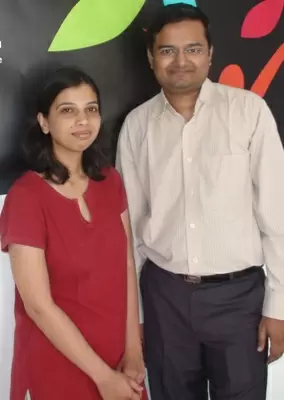Rang De couple wants to root out poverty in Indian villages

25-February-2011
Vol 2 | Issue 8
Ramakrishna NK is lost for words when asked how he became so interested in poverty alleviation that he chucked a high paying corporate job, packed his bags to India after a three-year stint in UK, and started Rang De, an organisation that offers small loans to the rural poor at very low interest.
“I always wanted to do something for the underprivileged people. But Rang Re was not an impulsive decision,” says the 36-year-old Chennai based co-founder of Rang De. Ram - as he is called by friends and colleagues - and his wife Smita, who too left her job in UK, decided to start Rang De after doing some serious research on the subject.
 |
|
Visionary couple: Ram and Smita have bigger plans to impact a larger number of rural poor with their low interest loans
|
Before conceiving Rang De, the couple had even toyed with the idea of starting a social enterprise that would employ rural youth in housekeeping services in cities. But all other ideas were put on the backburner when the contours of Rang De took a firm shape in their mind inspired by the works of Prof. Muhammad Yunus.
Ram does not hide his admiration for Yunus, the Bangladeshi economist and founder of Grameen Bank who popularised microcredit to fight poverty and was awarded the Noble Peace Prize in 2006 for his efforts.
Ram and Smita researched Rang De thoroughly and were convinced it was their calling. With a saving of Rs.5 lakh they plunged into the project, leaving their jobs in the UK, and returning to India.
Looking back, they have no regret. Since its inception in 2008, Rang De has so far distributed loans worth about Rs.3.5 crores to nearly 7000 people in rural areas of 12 States, including Tamil Nadu, Andhra Pradesh, Karnataka, Kerala, and Maharashtra. Gujarat, Madhya Pradesh and Uttar Pradesh.
With their funding starting at Rs.1000 and going up to Rs.25000 for ‘micro-ventures’, Rang De is a boon for the struggling masses unaffected by India’s GDP growth. Rang De’s target group of beneficiaries are the estimated 410 million Indians living in poverty.
By charging a nominal interest rate of around 5 to 10 percent per annum, Rang De has saved many families from the clutches of blood-sucking money lenders stalking rural India.
Many families in Indian villages fall into debt borrowing at exorbitant interest and commit suicide when they are unable to repay the loan. That’s where Rang De steps in with its humane plan to help such people in need.
For instance, take Saida Bi Mo Sadik from Vasant Nagar, Maharashtra, who requires a loan of Rs. 6400 to expand her mutton business. She plans to invest the money in buying some goats. Rang De has posted the requirement on their website, along with other similar cases. People have the option of funding any of the showcased projects with a minimum investment of Rs.100. Payment can be made online.
The success of Rang De has been its ability to generate funds from the booming Indian upper-middle class, which is often accused of being self-indulgent and lacking social responsibility.
It is safe to assume that the investors have a social bent of mind in putting their money in Rang De, since the monetary returns they get are very meagre – just 2 percent interest per annum.
“Most of our investors are from the IT field,” says Smita, who is a post graduate in social work from Roshni Nilaya in Mangalore.
Rang De’s operations are transparent. As per the existing system, each investor is able to identify the beneficiary, choose the amount he wants to invest, and keep a track of the repayment process.
“We have made the whole process very transparent,” says Ram. People invest anywhere from Rs.100 to even as high as Rs.10 lakhs – which incidentally is the highest investment so far.
As for the revenue model, Rang De depends on volumes of transactions to sustain itself. The organisation takes a 1 percent cut from the repaid money of borrowers. They also do fundraising events and sell Rang De merchandise like T Shirts and calendars to generate revenue.
















